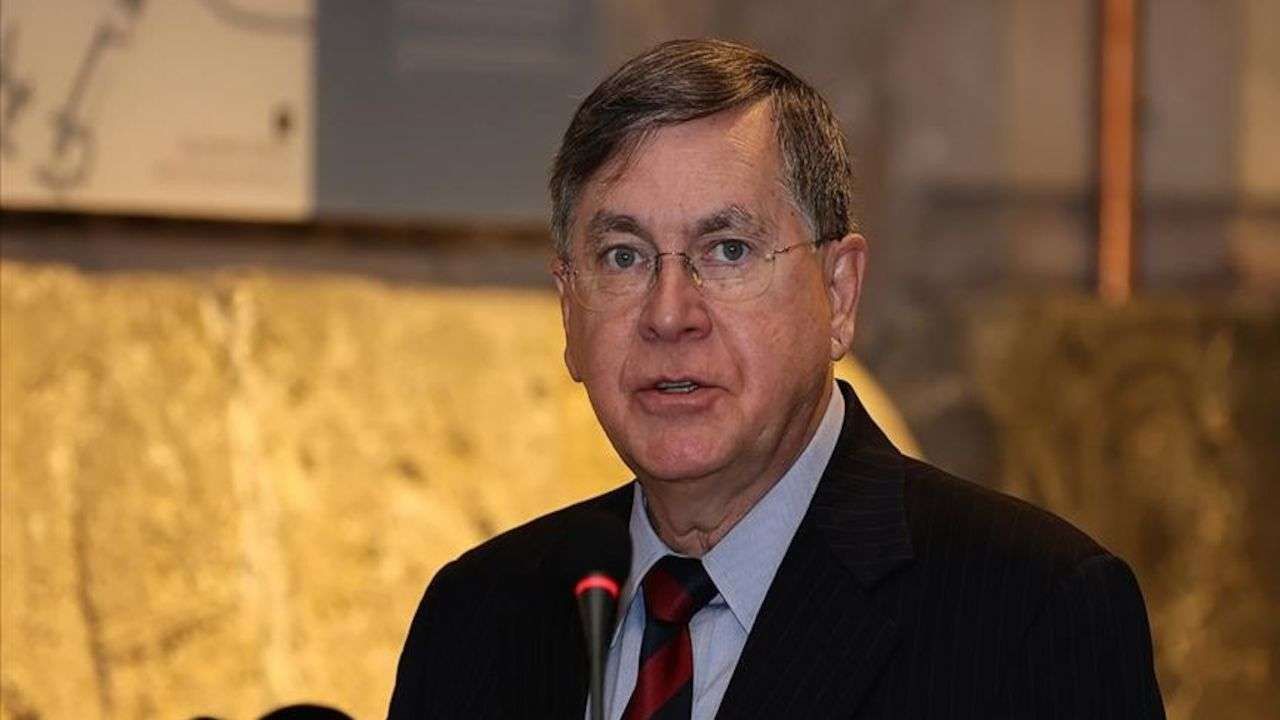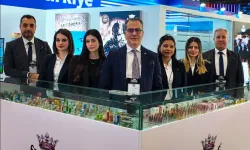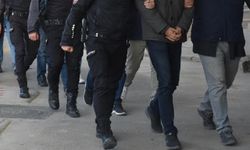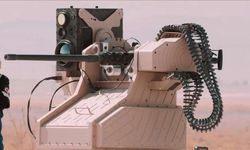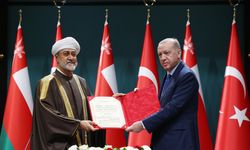The US ambassador to Turkey said on Friday thatüthey hope the S-400 issue between Turkey and the US can be resolved.
çWe hope that the issue of S-400 can be resolved. But if it cannot be, we will continue to focus on all the areas of our cooperation that are not directly affected by the sanctions which we put into place,çüDavidüSatterfield told reporters, evaluating Turkey-US relations.
The US administration imposedüsanctions çvery preciselyç, he said, noting:üçWe did not aim at affecting the Turkish defense sector as a whole, but rather specific licenses to SSP. We were compelled to take this step with regret.ç
He added: çThere is no study group, working group, nor will there be. This is an issue of the execution of US statute and US law.ç
On Dec. 14, the USüimposedüsanctionsüon Turkey over the acquisition of the RussianüS-400 missile defenseüsystem.
USüofficialsühave voiced opposition to the deal, claiming theüS-400süwould be incompatible with NATOüsystemsüand expose F-35 jetsüto possible Russianüsubterfuge.
Turkey, however,üstressed that theüS-400süwould not be integrated into NATOüsystems, and pose no threat to the alliance or itsüarmaments.
Turkish officialsühave repeatedly proposed a working group to examine the technical compatibility issue.
Stressing the significance they attachüto relations in all dimensions with Turkey, including trade and economy,üSatterfield saidüTurkey is an important and valuable strategic partner of the US and a NATO ally.
'We haveüalways been confident in fundamental strengths of Turkish economy'
The US hasüover $30 billion of investmentüin Turkey, while the volume of bilateral trade exceeds $20 billion, Satterfield noted, sayingüthere are alsoü1,700 USücompaniesüdoing businessüinüTurkey.
çWe employ a well over 75,000 Turks in these businesses. This is an important relationship for the United States. It's an important relationship for Turkey, for Turks and for Americans. And it's a relationship security dimension. In its economic commercial dimension, we very much would like to build and expand,çüSatterfield added.
Recalling the çaspirational goalç of $100 billion bilateralütrade volume, he noted thatüalthough this is ça very ambitious target, given the current level of $20 billionç, they willücontinue to do anythingütoüpromote Turkish business in the United States.
çWe've seen real progress in return of foreign direct investment to Turkey over the last few months, that's encouraging. Stabilization of the value of the Turkish] lira has also been encouraging. These are positive directions, we have always been confident in the fundamental strengths of the Turkish economy,çüSatterfield stressed.
Turkey-Greece meetings
Touching on the 61st round of theüexploratory talks between Turkey and Greeceüheld in Istanbul, he saidüthe US welcomesüthe re-engagement of the meetings andülooksüto the next roundüplanned to takeüplace in the Greek capital Athens.ü
çThis is a very positive development, and it has the strongest possible support of the United States and I think broadly,üEurope and the international community.üWe'd like to see these talks continue, we would like to see a continued effort by both states to refrain from unilateral actions which generate distrust, and can produce the potential of escalation or confrontation,çüSatterfield noted.
The US acknowledges and appreciates measures thatüTurkey has taken to build such an atmosphere as well as efforts undertaken by Greece, he said,üadding that these kinds of issues are çtough,ülong-standing, and complex issuesç asümaritime questions.
çBut with good faith, with sustained effort and commitment, they are issues that ultimately can arrive at a resolution. We've seen that happen in other, even more complex, even more difficult situations,ç he added.
'We are very supportive of UN-led Libyan Political Dialogue Forum'
Recallingütheüfirst in a series of votes on the election of Libya'süinterimüpresident and prime minister, the US ambassador said: çWe are very supportive of the UN-led Libyan Political Dialogue Forumç.
çIt's in the interest of everyone to support this UNüprocess, to see stability restored in a political context to Libya and to see preparations made for the ultimate goal of elections at the end of the year and withdrawal of all foreign forces from that troubled country,ç he noted.
Mohammad Younes Menfi onüFriday was elected the president ofüLibya's interim government, and Abdul Hamid Mohammed Dbeibah the prime minister in the Presidency Council during voting in an unnamed location in Switzerland not far from Geneva.
Libyaühas been torn by civil war since the ouster of late ruler Muammar Gaddafi in 2011.
Based in the capital Tripoli and currently led by Prime Minister Fayez al-Sarraj, the Government of National Accord --üthe country's legitimate government -- was founded in 2015 under a UN-led agreement.
Despite the cease-fire deal, itühas documented regular breaches by militias affiliated with warlord KhalifaüHaftar.
International efforts for a permanent political settlement, however, are still underway.
New US administration
The Bidenüadministration will be formulating its policy approaches onüa number of international issues of interest to Turkey, Satterfield said, recallingüPresident Joe Biden's reaffirmingüthe strong support of his administration for transatlantic relations for NATO.
çFor the US relationship with Europe, the idea of EU,üthe European Union, we strongly encourage and this is not new, the closest of ties between Turkey and the EU. That's in the EU interests and it's in Turkey's interest, and it's in the United States interest,ç the US envoy stressed, adding that they will continue toübe helpful in this regard.ü
On Iran, he said the new US administration will also be formulating an approach to this çextremely complex challengeç for the global community.
çContinued concern over radical extremism, Syria, Iran, elsewhere around the region and the world, all of these are going to be issues which the United States will be taking on a final note,ç he added.
Defeated coup of July 15, 2016
çWe are concerned about] comments by senior Turkish officials, which would hold the US accountable for a series of developments in Turkey, including the 2016 coup attempt],ç he said, referring to Turkish Interior Minister Suleyman Soylu's statement holding the US responsible forüthe 2016 defeated coup.
RecallingüUS State Departmentüspokesperson Ned Price's remarks in this regard, Satterfield said: çTheseüare baseless allegations. They're not responsible statements from an ally and a strategic partner. And we regret them.ç
FETOüand its US-based leader Fetullah Gulen orchestrated the defeated coup of July 15, 2016, in which 251 people were martyred and nearly 2,200 injured.
Turkey accusesüFETOüof a long-running campaign to overthrow the state through the infiltration of Turkish institutions, particularly the military, police, and judiciary.
He also said theyüregret statements with respect toüthe LGBTQI, whether those statements are made here in Turkey or elsewhere around the world.
Touching on Turkey'süstate lenderüHalkbankücase, he said it is çnot a matter for the USüadministrationç, adding: çThe matter of the judicial proceedings in the Southern District of New York with respect to Halkbank case lies exclusively in the whelm of USücourts.ç
ü'We continue to work with SDF'
Mentioning that his country's position regarding the SDF -- the Syrian offshoot of the YPG/PKK terror group --ühas not changed,üSatterfield noted that they will continue toüwork with the SDF in northeast Syria.
çWe continue to engage in efforts to confront the threat posed by ISIS/Daesh in northeast Syria, as we work to address that threat elsewhere in the region. In northeast Syria, we continue to work with the SDF in that challenge.çü
In its more than 30-year terror campaign against Turkey, theüPKK --ülisted as a terrorist organization by Turkey, the US, andüEU --ühas been responsible for the deaths of nearly 40,000 people, including women, children, and infants. The YPG is theüPKK's Syrian offshoot, andüin 2017,üthe terror group sought to re-brand itselfüas the so-calledüSDF.
Source: AA
